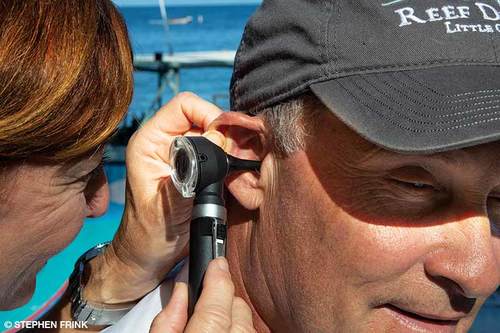Outer- and Inner Ear Infections

I have had problems with both outer- and inner-ear infections. How can I prevent them from happening after a dive?
There are ways to mitigate the risk of external ear infections (swimmer’s ear or otitis externa). Never clean your ear canal with items such as cotton swabs or other objects that might cause damage. Trauma to the external canal disrupts the protective epithelium that, along with earwax, prevents infection.
A cleansing mixture of 50 percent isopropyl alcohol and 50 percent vinegar is inexpensive and easy to use. The key is using it properly. Put two to three drops in one ear first thing in the morning. Allow it to sit in the ear for five minutes, and then repeat with the other ear. Do this procedure again at night after finishing your diving for the day. The alcohol dries the ear, and the vinegar slightly changes the pH to make it difficult for bacteria to propagate. Remember that this is a preventative measure and not a treatment. If you are ever diagnosed with otitis externa, follow your doctor’s advice, and please don’t put this solution in your ears.
The best prevention for middle-ear infections (otitis media) is using a proper equalization technique. Repeated pressure injuries (barotraumas) cause congestion, which can lead to infection if the ear is unable to drain normally. Barotrauma can be difficult to differentiate from otitis media because the ear drums can appear similar in both conditions during an otoscopic exam. It is important to tell your physician when the symptoms began.
Diving again before your symptoms are entirely gone lengthens your healing time, exacerbates the original injury and risks rupturing the tympanic membrane. You can find additional information about ears and diving on the DAN website at DAN.org/health-medicine/health-resource/dive-medical-reference-books/ears-diving.
— Lana P. Sorrell, MBA, EMT, DMT
There are ways to mitigate the risk of external ear infections (swimmer’s ear or otitis externa). Never clean your ear canal with items such as cotton swabs or other objects that might cause damage. Trauma to the external canal disrupts the protective epithelium that, along with earwax, prevents infection.
A cleansing mixture of 50 percent isopropyl alcohol and 50 percent vinegar is inexpensive and easy to use. The key is using it properly. Put two to three drops in one ear first thing in the morning. Allow it to sit in the ear for five minutes, and then repeat with the other ear. Do this procedure again at night after finishing your diving for the day. The alcohol dries the ear, and the vinegar slightly changes the pH to make it difficult for bacteria to propagate. Remember that this is a preventative measure and not a treatment. If you are ever diagnosed with otitis externa, follow your doctor’s advice, and please don’t put this solution in your ears.
The best prevention for middle-ear infections (otitis media) is using a proper equalization technique. Repeated pressure injuries (barotraumas) cause congestion, which can lead to infection if the ear is unable to drain normally. Barotrauma can be difficult to differentiate from otitis media because the ear drums can appear similar in both conditions during an otoscopic exam. It is important to tell your physician when the symptoms began.
Diving again before your symptoms are entirely gone lengthens your healing time, exacerbates the original injury and risks rupturing the tympanic membrane. You can find additional information about ears and diving on the DAN website at DAN.org/health-medicine/health-resource/dive-medical-reference-books/ears-diving.
— Lana P. Sorrell, MBA, EMT, DMT
Posted in Alert Diver Summer Editions, Dive Fitness, Dive Safety FAQ, Return To Diving
Posted in Inner ear, Infections, Outer ears, isopropyl alcohol, otitis media, proper equalization
Posted in Inner ear, Infections, Outer ears, isopropyl alcohol, otitis media, proper equalization
Categories
2025
2024
February
March
April
May
October
My name is Rosanne… DAN was there for me?My name is Pam… DAN was there for me?My name is Nadia… DAN was there for me?My name is Morgan… DAN was there for me?My name is Mark… DAN was there for me?My name is Julika… DAN was there for me?My name is James Lewis… DAN was there for me?My name is Jack… DAN was there for me?My name is Mrs. Du Toit… DAN was there for me?My name is Sean… DAN was there for me?My name is Clayton… DAN was there for me?My name is Claire… DAN was there for me?My name is Lauren… DAN was there for me?My name is Amos… DAN was there for me?My name is Kelly… DAN was there for me?Get to Know DAN Instructor: Mauro JijeGet to know DAN Instructor: Sinda da GraçaGet to know DAN Instructor: JP BarnardGet to know DAN instructor: Gregory DriesselGet to know DAN instructor Trainer: Christo van JaarsveldGet to Know DAN Instructor: Beto Vambiane
November
Get to know DAN Instructor: Dylan BowlesGet to know DAN instructor: Ryan CapazorioGet to know DAN Instructor: Tyrone LubbeGet to know DAN Instructor: Caitlyn MonahanScience Saves SharksSafety AngelsDiving Anilao with Adam SokolskiUnderstanding Dive Equipment RegulationsDiving With A PFOUnderwater NavigationFinding My PassionDiving Deep with DSLRDebunking Freediving MythsImmersion Pulmonary OedemaSwimmer's EarMEMBER PROFILE: RAY DALIOAdventure Auntie: Yvette OosthuizenClean Our OceansWhat to Look for in a Dive Boat
2023
January
March
Terrific Freedive ModeKaboom!....The Big Oxygen Safety IssueScuba Nudi ClothingThe Benefits of Being BaldDive into Freedive InstructionCape Marine Research and Diver DevelopmentThe Inhaca Ocean Alliance.“LIGHTS, Film, Action!”Demo DiversSpecial Forces DiverWhat Dive Computers Don\'t Know | PART 2Toughing It Out Is Dangerous
April
